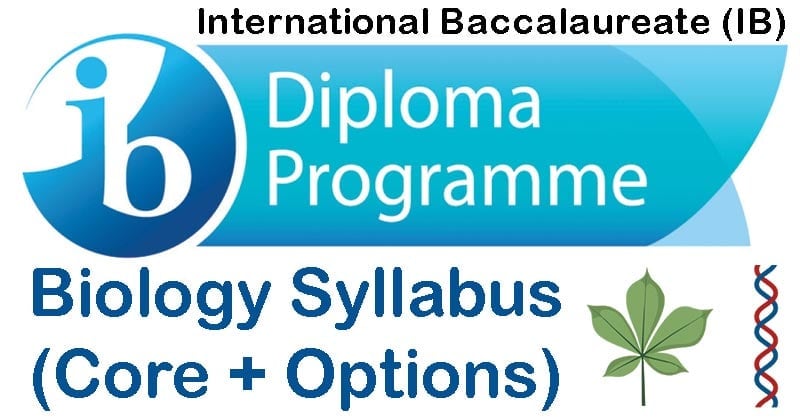
Image Credit: International Baccalaureate Organization.
Interesting Science Videos
Core Topics (95 Hours)
Topic 1. Cell biology (15 Hours)
1.1 Introduction to Cells
1.3 Membrane Structure
1.4 Membrane Transport
1.5 The Origin of Cells
1.6 Cell Division
Topic 2. Molecular biology (21 Hours)
2.1 Molecules to Metabolism
2.2 Water
2.3 Carbohydrates and Lipids
2.4 Proteins
2.5 Enzymes
2.6 Structure of DNA and RNA
2.7 DNA Replications, Transcription, and Translation
2.8 Cell Respiration
2.9 Photosynthesis
Topic 3. Genetics (15 Hours)
3.1 Genes
3.2 Chromosomes
3.3 Meiosis
3.4 Inheritance
3.5 Genetic Modification and Biotechnology
Topic 4. Ecology (12 Hours)
4.1 Species, Communities, and Ecosystems
4.2 Energy Flow
4.3 Carbon Cycling
4.4 Climate Change
Topic 5. Evolution and biodiversity (12 Hours)
5.1 Evidence for Evolution
5.3 Classification and Biodiversity
5.4 Cladistics
Topic 6. Human physiology (20 Hours)
6.2 The Blood System
6.3 Defense Against Infectious Disease
6.4 Gas Exchange
6.5 Neurons and Synapses
6.6 Hormones, Homeostasis, and Reproduction
Additional Higher Level (HL) Topics (60 Hours)
Topic 7. Nucleic Acids (9 Hours)
7.1 DNA Structure and Replication
7.2 Transcription and Gene Expression
7.3 Translation
Topic 8. Metabolism, Cell Respiration, and Photosynthesis (14 Hours)
8.1 Metabolism
8.2 Cell Respiration
8.3 Photosynthesis
Topic 9. Plant Biology (13 Hours)
9.1 Transport in the Xylem of Plants
9.2 Transport in the Phloem of Plants
9.3 Growth in Plants
9.4 Reproduction in Plants
Topic 10. Genetics and Evolution (8 Hours)
10.1 Meiosis
10.2 Inheritance
10.3 Gene Pools and Speciation
Topic 11. Animal Physiology (16 Hours)
11.1 Antibody Production and Vaccination
11.2 Movement
11.3 Kidney and Osmoregulation
11.4 Sexual Reproduction
Optional Topics
Option A. Neurobiology and Behaviour (15 Hours for SL and 25 hours for HL)
A.1 Neural development
A.2 The human brain
A.3 Perception of stimuli
A.4 Innate and learned behavior (Higher Level Only)
A.5 Neuropharmacology (Higher Level Only)
A.6 Ethology (Higher Level Only)
Option B. Biotechnology and Bioinformatics (15 Hours for SL and 25 hours for HL)
B.1 Microbiology: organisms in industry
B.2 Biotechnology in agriculture
B.3 Environmental protection
B.4 Medicine (Higher Level Only)
B.5 Bioinformatics (Higher Level Only)
Option C. Ecology and Conservation (15 Hours for SL and 25 hours for HL)
C.1 Species and communities
C.2 Communities and ecosystems
C.3 Impacts of humans on ecosystems
C.4 Conservation of biodiversity
C.5 Population ecology (Higher Level Only)
C.6 Nitrogen and phosphorus cycles (Higher Level Only)
Option D. Human Physiology (15 Hours for SL and 25 hours for HL)
D.1 Human Nutrition
D.2 Digestion
D.3 Functions of the Liver
D.4 The Heart
D.5 Hormones and Metabolism (Higher Level Only)
D.6 Transport of Respiratory Gases (Higher Level Only)
Practical scheme of work (40 Hours for SL and 60 Hours for HL)
Practical activities (20 Hours for SL and 40 Hours for HL)
Individual Investigation (10 Hours for SL and HL)
Group 4 project (10 Hours for SL and HL)
Disclaimer: Syllabus and contents on this page are only used for educational purposes. If there are any copyright issues regarding the content, please email us at microbenotes@gmail.com.
